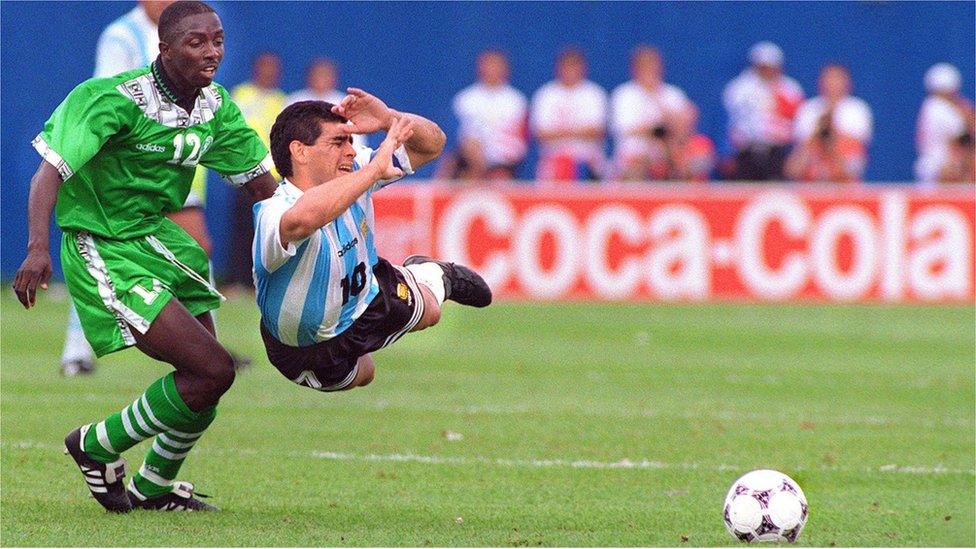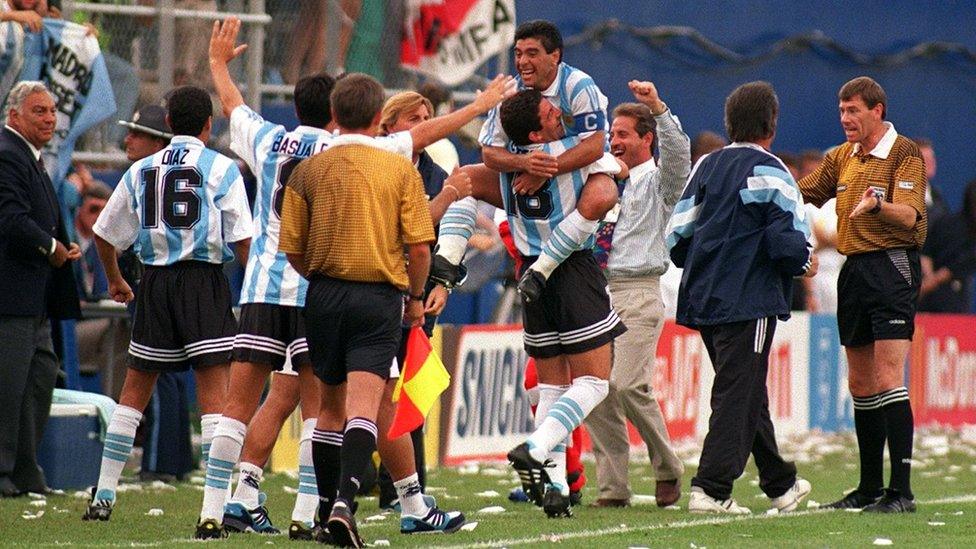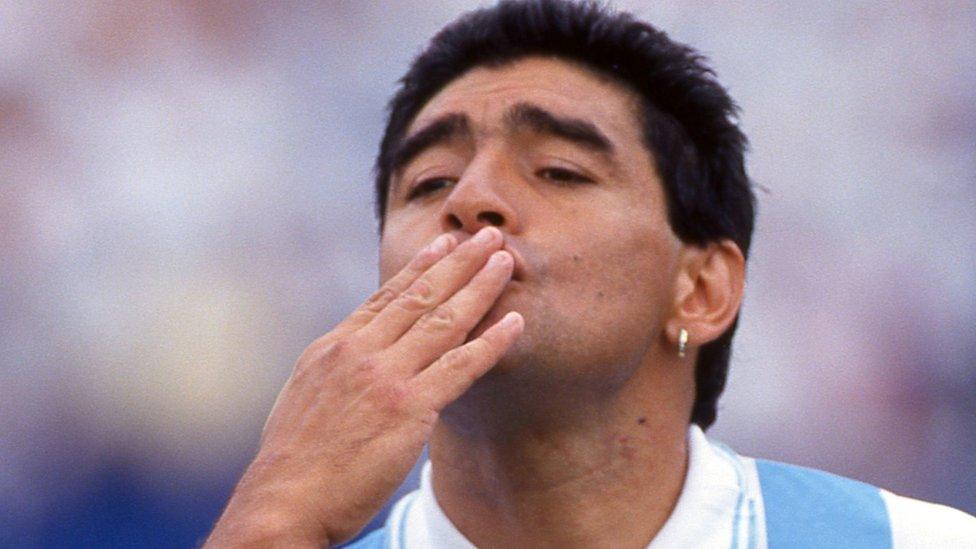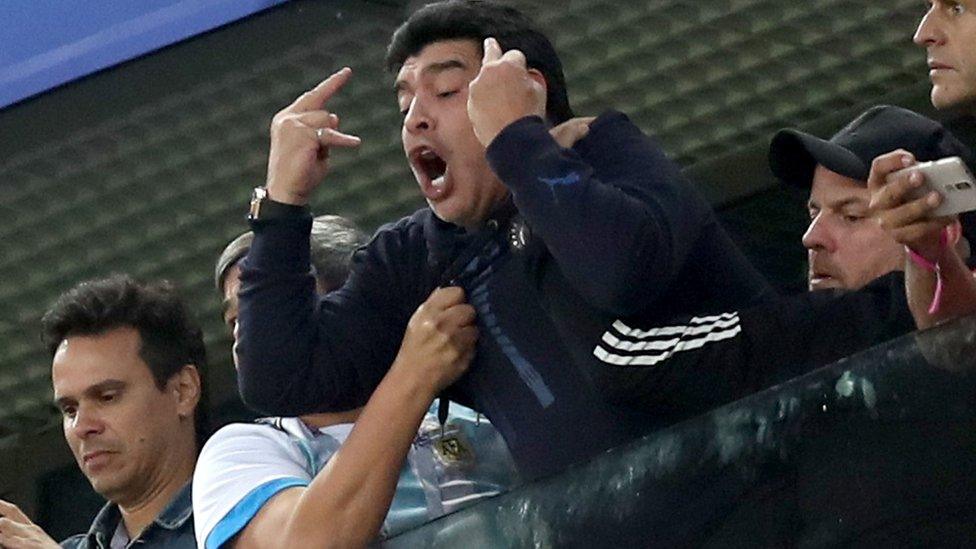Diego Maradona: how his genius shone in his last Argentina game
- Published

Maradona was flying very high against the Super Eagles
One of the most famous - and most important - maxims in theatre is to always leave the crowd wanting more.
And as one of the most theatrical footballers to have played international football, Diego Maradona certainly did that - albeit not through choice.
That Maradona left the World Cup at USA '94 after failing a drugs test is well-remembered - allied, albeit mistakenly, to his wide-eyed celebration having scored against Greece in a group game.
Popular memory joins the drugs test with that celebration and thinks they were the same match. But in actual fact, it was after Argentina's next game, against Nigeria in Boston, that Maradona failed his test.
And it was a game in which he had shown he was still at the absolute peak of his powers - at least in a blue-and-white shirt. The unanswered question, of course, is how much of that was down to drugs.
The subtle trick

Argentina celebrate scoring against Nigeria
Although his club career had begun to peter out - he had spent a season ineffectively at Sevilla in 1992/93 before heading back to Newell's Old Boys in Argentina - Maradona had always been able to raise his game for his national team.
And against Nigeria in Group D on 25 June 1994, he was so good there was talk of him inspiring them to their third successive World Cup final.
First, however, there was a big shock to deal with: Nigeria had gone ahead after just eight minutes.
It was through a fast break that was absolutely typical of the Super Eagles at the time.
Aptly, Rashidi Yekini showed Maradona-esque skill to dummy his way through two Argentina midfielders at once before setting up Samson Siasia. Siasia had all the time in the world to chip Luis Islas; the Argentina goalkeeper was so far out of his goal he had crossed an international date line.
Briefly, it looked like it could be the second time in two World Cups that Argentina had been bested by African opposition, after their 1-0 defeat to Cameroon that opened Italia '90 - still one of the greatest shocks in the history of the tournament.
But it was not to be. And, typically, that was mostly down to Maradona.
The equaliser especially featured an under-remembered trick so subtle, so deft, it showed the very apex of what Maradona was about.
On 21 minutes, Argentina had won a free-kick around 25 metres from goal - a dangerous position, but not undefendable.
As Nigeria set up their wall, both Maradona and Gabriel Batistuta - himself already proving to be one of the greatest strikers in Serie A, and therefore Europe, at the time - stood at equal distance from the ball; Batistuta to the left, Maradona to the right.
Both were renowned dead-ball specialists, so the Nigeria wall was wary. Both had given themselves plenty of run-up, indicating a powerful shot was due.
As the referee's whistle blew, it was Maradona who moved first. Expecting the ball to come flying in via Maradona's left foot, the Nigeria wall moved right.
But instead, Maradona deftly, gracefully - with the precision of a ballerina landing on the tip of their toes - flicked the ball backwards, to the exact blade of grass Batistuta was running towards.
His dummy had done its work. Batistuta's shot thundered in through the empty space from where Nigeria's wall had shifted.
Nigeria's goalkeeper Peter Rufai did well to get to down to it, but he only palmed it to the feet of Claudio Caniggia, who smashed it in.
'Freedom of Massachusetts'

Maradona's celebration of Argentina's second goal suggested he knew just how good it was
Seven minutes later, Argentina went ahead - again set up by a Maradona free kick.
If the first one had been all about skill, the second was all about cunning.
Maradona had the ball in midfield and almost idly played it towards Caniggia - but, before the striker could do anything with it, the referee signalled for a free-kick back where Maradona had passed from.
Maradona theatrically grabbed the ball, put it down, held up his hands. He made a gesture waving all his fingers in the air. To all the world - and certainly to all the Nigeria players - it looked like he was planning something extravagant that they would need to prepare for.
But instead he suddenly dinked the ball forward to where Caniggia had been waiting, furiously yelling "Diego! Diego!"
The Nigeria defence was caught completely cold. They'd been expecting a long delay while Maradona thought out a way through their defences - but instead he and Caniggia, who gleefully stroked home his second, had just walked through the front door.
"Caniggia was given the freedom of Massachusetts there" said John Motson on BBC commentary. He was right, but it was Maradona who had handed him the keys to the state.
No way back

Maradona's famously wild goal celebrations continued into his later life as a fan - here celebrating a goal in the 2018 World Cup against Nigeria
Though the game would continue to flow for most of the match, and be one of the most entertaining of the entire tournament, there were no more goals.
And - though no-one knew it at the time - there would be no more for Maradona at all in an Argentina shirt.
Shortly afterwards, news came through that he had tested positive for drugs use in the Nigeria match.
But it was his reaction to scoring in the previous match against Greece - wide-eyed, staring right down the barrel of the touchline camera - that suddenly defined him. Yes of course he was on something, TV viewers said - he just looked like it. He had been banned for cocaine use before.
Without their inspirational captain, the team that had reached the last two finals of the World Cup went out to Romania in the last 16.
Would Maradona have been so good against Nigeria if he had not taken ephedrine? It's impossible to know. It did not materially affect the World Cup, as other results meant Nigeria topped the group anyway.
Though Maradona later contested the drug test, saying it had been caused by a difference in ingredients between a brand of drink in Argentina and the US, it was to no avail.
He was out of the blue-and-white stripes, and would not be back.